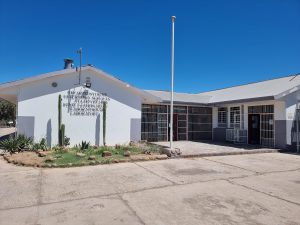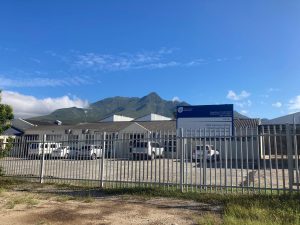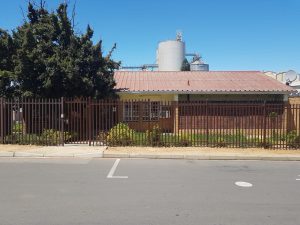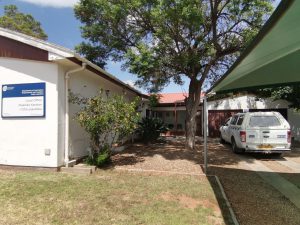Animal health and disease control
State veterinarians (SV) assisted by animal health technicians (AHT) at eight state veterinary offices throughout the province are responsible for the surveillance, control, and eradication of animal diseases. Access a map of the SV areas and contact details for the offices here.
Regular testing, monitoring, and surveillance are conducted on livestock, ostriches, poultry, and pet animals for diseases such as bovine tuberculosis, bovine Brucellosis, rabies, and sheep scab and trade-sensitive diseases such as foot and mouth disease and mad cow disease.
These actions play a major role to provide disease-free guarantees for exports of animals and animal products. The province exports more than 90% of the country’s ostrich meat and other products generated by the ostrich industry. Intensive surveillance for Newcastle disease and Avian influenza and a registration system on ostrich export farms is conducted in several of the state veterinary areas.
A serum data bank has been established to provide scientific evidence on the occurrence or absence of animal diseases. The province is free of the major trade-sensitive diseases such as foot and mouth disease and also has the only African horse sickness free zone in the country from where horses are accepted for export worldwide.
The epidemiology section of Western Cape Veterinary Services is tasked with assisting State Veterinarians during outbreak campaign. Epidemiology also encompasses the design of surveillance programs for various animal diseases and assists in determining the status of diseases in the Western Cape Province. The section maintains animal surveillance databases as well as information on the animal census. It also publishes a monthly newsletter with pertinent epidemiological information which can be used by private veterinarians as an information source.
State veterinarians are responsible for training and education on both a formal and informal basis. Formal training is provided through the Elsenburg Agricultural Training Institute to students pursuing a Bachelors degree in Agriculture in the form of subjects on animal health as well as a registered bovine artificial insemination course. Animal Health Technicians (AHTs) also complete the Tuberculosis and Brucellosis component of their studies under the supervision of a state veterinarian and experienced AHT. Informal training is given to veterinary science students during their studies to expose them to the work of a state veterinarian.
The control animal health technician (CAHT) in each state veterinary office monitors and oversees the work of the other AHTs and also mentors AHT students during their final year of training which is an experiential training year.
Controlled Diseases
Foot and Mouth Disease
Background & clinical signs of FMD
Foot-and-mouth disease (FMD) is a highly contagious viral disease affecting cloven-hoofed animals like cattle, sheep, goats and pigs. It has the potential to cause severe economic loss and animal suffering. Foot-and-mouth disease is a government-controlled disease because it spreads so easily and because of its major impact on the country’s economy.
The severity of clinical lesions caused by FMD virus depends on the host species, breed, immune status, and the virus strain. Blister-like lesions form between two and eight days after the animal was infected, though this incubation period can be up to 14 days. The blisters then burst to form erosions or ulcers. In cattle, the lesions usually occur on the top surface of the tongue and dental pad, though they can occur elsewhere in the mouth, and the pain can cause salivation. Lesions on the feet occur between the claws, at the junction of hoof and skin, and on the bulbs of the heel, causing lameness. Cows in milk experience a significant drop in milk production and painful teat lesions, which can lead to difficulties in milking and secondary mastitis. In young domestic animals, death can occur suddenly due to damage to the heart muscle. The pain caused by FMD lesions leads to poor growth and production, which, together with the highly contagious nature of the virus, is why there are severe trade restrictions on infected countries.
Infected animals start shedding virus, mostly in saliva, before they show clinical signs and can spread the disease directly to other animals or indirectly via animal products, equipment, human contact, feed, and vehicles. The virus is fairly resistant to sunlight and survives long periods in bone marrow, lymph nodes, and blood in large blood vessels.
During the incubation period, animals appear normal and healthy, and if they are moved, the disease spreads with them. Auctions, in particular, create dangerous opportunities for animals from different origins to gather, mix, and move to new locations where they can introduce diseases contracted from infected animals at the auction.
For Frequently Asked Questions and Answers, click here
The current foot and mouth disease situation and livestock movement requirements
As of February 2026, there are currently unresolved outbreaks of FMD in all 9 provinces of South Africa.
In order to reduce the risk that FMD is spread with infected animals, Government Gazette notice 50977 , issued in July 2024, requires cattle, sheep and goats moving within areas outside FMD disease management areas (including the Western Cape) to be accompanied by the following documents (with some exceptions for gatherings of animals) see below:
(1) Owner declaration / Eienaarsverklaring attesting to the origin and health status of the animals;
(2) Undertaking of the animal recipient/buyer at destination / Onderneming van ontvanger/koper by bestemming that the animals will be isolated on the farm of destination for at least 28 days before introducing them into the main herd.
Additionally, in the Western Cape
(3) The local State Veterinarian should be informed of all movements of FMD-susceptible animals into and out of the province. Owners of cattle, sheep and goats in the Western Cape must please report all movements of animals on the animal movement app. After receiving the notification, the State Veterinarian will assess the risk of the movement and may need to inspect the animals after arrival.
It is also advised that if you are buying animals from outside the Western Cape or from someone you do not know, you should request that they supply a veterinary health certificate.
Importation of livestock
Any cloven-hooved livestock that has been imported from a neighbouring country and is transported into the Western Cape must be able to show the normal documentation for imported animals, and does not need additional owner and recipient declarations.
The Western Cape Province is currently doing active surveillance by testing cattle all over the province for FMD. We plead with all of the livestock producers of the Western Cape to abide by the guidelines to ensure our province remains free from FMD and the devastating consequences that come with it.
General preventive measures for FMD (in all species)
- Disinfect vehicle wheels and equipment that move between farms with an effective disinfectant, and avoid these movements where possible.
- Change or clean footwear and clothing when leaving any farm.
- Do not handle other animals within 5 days of having contact with suspected infected animals.
- Only add new animals of known origin and health status to existing stock and be particularly careful when purchasing at auctions.
- Quarantine purchased animals for a period of 28 days before mixing with the rest of the herd.
- Only allow access to livestock by people and equipment with a known low risk of transferring disease.
- Monitor and report livestock illness to the local State Veterinarian.
- Ensure appropriate disposal of manure and carcasses.
REMEMBER that people transporting livestock must adhere to Articles 6 and 8 of the Stock Theft Act (Act No 57 of 1959) and ensure that a completed document of identification travels with the animals. Available at: Article 6 document and Article 8 document
Biosecurity requirements for gatherings of animals
The most common method of spread of FMD remains the movement of animals. When animals gather (e.g. at auctions and shows) it creates a dangerous opportunity for disease spread, since animals mix and then go off to new locations. For this reason, measures as stipulated in Government Gazette notice 52868 need to be put in place at any point where animals gather.
For more information concerning agricultural shows, please refer to our fact sheet and poster for guidelines.
- Registration of approved ostrich compartments
- Official control of registered ostrich compartments
- Movement of ostriches between registered ostrich compartments
For forms and procedures relating to these activities, please contact the South African Ostrich Business Chamber (SAOBC)
Read more about the danger of Brucellosis and Tuberculosis spread at auctions and shows!
Bovine Brucellosis
Brucellosis is a zoonosis which means that it is an infectious disease which can be transmitted from animals to humans. It is caused by bacteria of the genus Brucella. It is primarily a disease of domestic animals (goats, pigs, cattle, dogs, etc) and humans and has a worldwide distribution, mostly now in developing countries.
Cattle affected with Brucella abortus have high incidences of abortions or weak calves, arthritic joints, and retention of the fetal membranes.
Bovine Tuberculosis
Bovine TB is also a zoonosis. It is a chronic wasting disease that causes considerable production losses and is caused by Mycobacterium bovis.
Click here to read more about Bovine Tuberculosis
The Animal Health subprogramme of Veterinary Services conducts TB and Brucellosis testing as part of national surveillance for these 2 important diseases. If a farm is diagnosed positive for either of these diseases, state officials will step in and control the disease which will involve culling infected animals and testing until the herd is once again clean. Brucellosis pamphlet A5 v2.pdf
Once the rabies virus has entered the nervous system there is no cure! The only way to prevent the virus from entering the nervous system is to clean and disinfect the bite wound immediately and to receive very specific medical attention in the form of post-exposure prophylaxis (PEP) so rather take the advice of the saying “prevention is better than cure”.
Click here to read the OIE disease card on rabies.
The Animal Health Technicians of Veterinary Services hold regular campaigns in various areas and on farms to vaccinate dogs and cats and to create awareness about rabies. Not only does Veterinary Services deliver this service free of charge, but they bring it right to the community and agri-workers, where it is most convenient for people who do not have the means to transport their animals to the local vet.
“African horse sickness (AHS) is a highly infectious and deadly disease of Equidae (horses, donkeys, mules, and zebra) caused by the African Horse Sickness virus which is a virus of the genus Orbivirus belonging to the family Reoviridae. AHS is not directly contagious but is spread by the Culicoides midge.
AHS is endemic to South Africa which means that it commonly occurs throughout the country. The Western Cape contains the only AHS-free zone in the country and therefore the only place that horse exports can take place from is Cape Town. As a result of this AHS control is strictly regulated in the province.
AHS is spread by biting midges and the vaccine used is a live virus vaccine. The cause of previous outbreaks of AHS in the AHS controlled area (AHS CA) has been identified as the spread of the vaccine virus between horses by these Culicoides midges. This is the reason why the vaccination period has been restricted to the period when the midges are least active in the AHS CA.
Consequently, African horse sickness vaccinations are now controlled in the AHS protection, surveillance and free zones of the Western Cape. The vaccination season in the AHS CA in the Western Cape is legislated by the National Department of Agriculture, Forestry and Fisheries (DAFF) to take place between 1 June and 31 October each year. Vaccination against AHS for horses in the AHS Surveillance and Free zones may only occur with written permission from State Vet Boland, and this permission can only be granted for vaccinations that are planned within this period.
Applications for permission to vaccinate against African Horse Sickness open in March every year so that permission can be granted timeously by State Vet Boland before vaccination can begin annually on 1st June in the African Horse Sickness Controlled area (Surveillance and Free zones) in the Western Cape.
Only registered AHS vaccines may be used during this time and it is illegal to use an unregistered vaccine or for a private person to vaccinate their horse in the AHS CA. All AHS vaccinations in the AHS CA must be done by a veterinarian. Permission must be applied for by your private veterinarian who will send an application to vaccinate@myhorse.org.za
Responsible vaccination against AHS decreases the risk of outbreaks in our region, which is to the benefit of our local horse population and increases international market access for South African horses. The public’s adherence to these requirements assists us to ensure there are no further outbreaks, either from the use of vaccines outside the permitted times or from the illegal movement of an infected horse into the area.
For more information visit the Stopover quarantine Protocol
Please take note of the following contact details where relevant:
For applications to move equids into and within the AHS-controlled area and enquiries related to equid movement, please contact move@myhorse.org.za
For applications to vaccinate equines against AHS in the AHS controlled area and enquiries related to vaccination in the AHS controlled area please contact vaccinate@myhorse.org.za
For information about the identification of horses, please contact passport@myhorse.org.za
For Pre-notification of movement please contact prenote@myhorse.org.za
For AHS case reporting or information on sample collection for AHS confirmation and testing please contact your local state veterinarian and/or results@myhorse.org.za
For queries regarding the registration of properties in terms of the Animal Diseases Act 1984 (Act no 35 of 1984) for the keeping of zebra or for movement of zebra within and into the AHS controlled area please contact zebra@myhorse.org.za
To report a transgression within the AHS controlled area relating to illegal movement, vaccination or any other equid-related law enforcement matter within or relating to the AHS controlled area please contact regulate@myhorse.org.za
For all other enquiries please contact your local state veterinarian.
The Department would like to thank all horse owners, veterinarians and everyone else involved in the equine industry for partnering with us to get direct exports to the EU reinstated.
Follow the link to visit the myhorse.org.za homepage, and for more information on African Horse Sickness control please visit myhorse.org.za VPN Page
2020-04-08 Media release of African Horse Sickness case confirmed
16 April 2021 NOTICE OF OUTBREAK CONTROL AREA: AFRICAN HORSE SICKNESS – CEDERBERG MUNICIPALITY
Situation report: African horse sickness in Cederberg Local Municipality: 20 April 2021
State Vet Offices

The Beaufort West State Veterinary Office, located in Upper Blythe Street, within the Beaufort West Municipality, is responsible for the Central Karoo district. This includes the towns of Beaufort West, Murraysburg, Laingsburg and Prince Albert. These areas are covered by the state veterinarian and five animal health technicians (AHT).
Contact details:
Dr Kayla Smith
Telephone: 023 414 9250
Email: Kayla.Smith2@westerncape.gov.za
Email: doa.svbeaufortwest@westerncape.gov.za
The Boland State Veterinary Office is located at the Head office of the Department of Agriculture at Elsenburg. The two state veterinarians together with the control Animal Health Technician and five animal health technicians (AHTs) are responsible for the greater Cape Town area, Paarl, Wellington, Franschhoek, Stellenbosch, Somerset West, and Gordon’s Bay.
Contact information:
Office reception
Telephone: 021 808 5253
E-mail: SVBoland@westerncape.gov.za
Dr. Vivien Malan
Vivien.Malan@westerncape.gov.za
Telephone: 021 808 5028
Dr. Solomon Bhandi
Solomon.Bhandi@westerncape.gov.za
Telephone: 021 808 7543

The George State Veterinary Office is located in Varing Street. The state veterinarian together with one control animal health technician and five animal health technicians (AHT) are responsible for the magisterial districts of George, Riversdal, Mossel Bay, Uniondale, and Knysna.
Contact details:
Dr Leana Janse van Rensburg
Telephone: 044 803 3770/1
Email: Leana.JanseVanRensburg@westerncape.gov.za
or


The Oudtshoorn State Veterinary Office is located at 39 Van der Riet Street.
The State Veterinarian together with the Control Animal Health Technician and three AHTs are responsible for the Klein Karoo and Kannaland regions, which include the towns of Oudtshoorn, De Rust, Calitzdorp, Vanwyksdorp, and Ladismith.
Contact details:
Dr. Cathy Fox
DOA.svoudtshoorn@westerncape.gov.za
Telephone: 044 203 9443/5

The Swellendam State Veterinary Office is located on Voortrekker Street.
The state veterinarian together with one control animal health technician and five animal health technicians (AHT) are responsible for the magisterial districts of Swellendam, Bredasdorp, Caledon, and Heidelberg.
Contact details:
Dr. Christi Kloppers
Christi.Kloppers@westerncape.gov.za
DOA.svswellendam@westerncape.gov.za
Telephone: 021 808 5059
Contact details:
State Veterinarian: Dr. Chanel Lombard
Telephone: 027 201 3510
Email:

The Worcester State Veterinary Office is located in 30 Van Arckel Street.
The state veterinarian together with one animal health technician (AHT) is responsible for the magisterial districts of Worcester, Ceres, Montagu, Robertson, Touwsrivier, and Tulbagh.
Contact details:
Dr. Ansulize Pepler
Telephone: 021 808 5052
Email:

